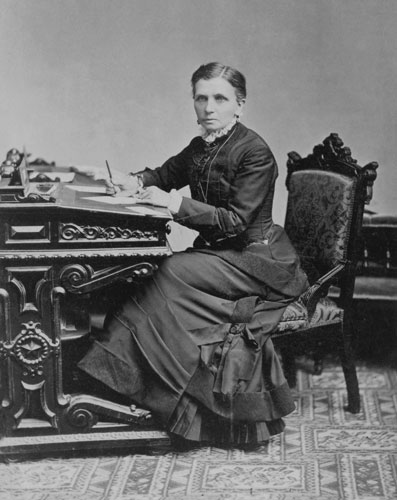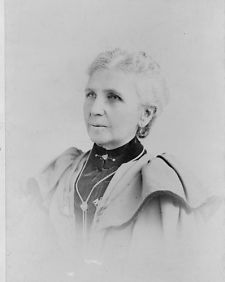
Additional Resources
Emmeline B. Wells,
A Thinking Woman
1828 - 1921
“I believe in women, especially thinking women.”
By Barbara Jones Brown
Former Better Days Historical Director

Emmeline B. Wells at her writing desk. Photo courtesy of Utah State Historical Society
Emmeline B. Wells was a thinker and a leader. No Utahn fought more for the suffrage cause than she did. An early advocate of women’s rights, from 1877 to 1914 she was the editor of the Woman’s Exponent, a twice-monthly periodical produced by Mormon women. Besides reporting news of the Relief Society (the LDS Church’s women’s organization), the Exponent championed women’s economic, educational, and suffrage rights. Though Emmeline was small, she wielded great power through her pen, writing many articles that spoke for women’s rights, especially a woman’s right to vote and run for public office.
Emmeline became one of the early women in the nation to vote when Utah Territory extended suffrage to women citizens in 1870. She then joined the fight for women to be able to vote throughout the United States. After she led Utah women in sending long petitions to Washington D.C. asking for a federal women’s suffrage amendment, Elizabeth Cady Stanton and Susan B. Anthony invited Wells to represent Utah at their 1879 National Woman Suffrage Association (NWSA) convention in Washington. There, Wells addressed the convention and was seated on the stand as a voting woman from Utah. She also joined others in speaking before Congressional committees and President and First Lady Rutherford B. and Lucy Hayes.

Emmeline B. Wells in 1900. Photo courtesy of Utah State Historical Society
“This was a valuable experience,” Wells wrote, for although Utah women then had the voting rights that most American women did not, “there was much to learn from the great leaders who had been laboring in the cause of women’s enfranchisement for more than thirty years.” Wells maintained lifelong friendships with Anthony, Stanton, and other national suffrage leaders, representing Utah in the NWSA, National American Woman Suffrage Association, and the National and International Councils of Women for the nearly three decades. Shortly before Anthony died, she sent one of her gold rings to Wells as a token of their friendship.
The U.S. Congress rescinded all Utah women’s voting rights through the Edmunds-Tucker Act in 1887. Congress passed the act in an effort to end the Mormon practice of polygamy in Utah and any political support for it. Outraged after losing the voting franchise they had exercised for seventeen years, Wells led Utah’s suffragists in battling to regain the ballot. She served as president of the Woman Suffrage Association of Utah during the Utah’s constitutional convention and worked to persuade male politicians to include women’s voting rights in the state constitution they would propose to Congress. Wells’ and others’ tireless lobbying efforts ensured that equal suffrage was included in Utah’s Constitution when Utah became a state in 1896. This made Utah just the third suffrage state behind Wyoming (1890) and Colorado (1893).

Welcoming envoys from San Francisco Exposition carrying national suffrage petition to Washington D.C., on steps of Utah Capitol – October 16th, 1915. Front (L to R): Maria. A. Kinderberg (driver of the automobile), Ingeborg Kindstedt (machinist), Emmeline B. Wells, and Sara Bard Field (messenger). Image courtesy of National Woman’s Party
In 1910, Emmeline was made General President of the Relief Society of the LDS Church. Wells described the Relief Society as “a charitable and philanthropic body which stood for reform and progress in all directions.” She served in that role until shortly before her death in 1921. The year before she died, Emmeline got to see the dream of national women’s suffrage fulfilled when Congress passed the 19th Amendment to the Constitution

